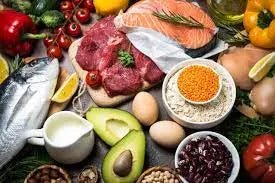
14 Nutrition Tips for Explosive Muscle Gain
For most of us in the modern world, gaining mass comes pretty easily. Unfortunately, with around 30% of our population being classified as 'obese', those easy mass gains aren't the kind we're looking for. But that's exactly what you'll see if you eat unsystematically without a regular exercise program.
For most of us in the modern world, gaining mass comes pretty easily. Unfortunately, with around 30% of our population being classified as 'obese', those easy mass gains aren't the kind we're looking for. But that's exactly what you'll see if you eat unsystematically without a regular exercise program.
If you're really committed to getting lean and putting on muscle, there are a number of nutrition-related tips that can help you with that goal. But before we get there, you'll have to disregard everything you've been taught so far about eating, dieting and nutrition.
If you're looking to gain the right kind of muscle mass instead of building your waistline, keep reading below for our 21 nutrition tips for explosive muscle gain. Sticking to a strict diet and routine may not be the most fun or glamorous thing in the world, but it's sure better than ending up like the other 30% of people.
Keep reading to get Gunsmith's lowdown on nutrition for bodybuilding.
1. Eat Smaller Meals More Often

One of the biggest challenges for bodybuilders is actually getting enough calories. If you're eating clean, healthy foods, it's often hard to eat enough in only 3 meals to fuel your workout. This is why a lot of professional athletes, bodybuilders included, will eat smaller meals more frequently. Instead of the traditional 3 meals a day, they may break their eating down into between 6 and 8 meals per day.
If you're really looking to add muscle mass, eating more meals is a necessity that makes sense. What this means is that you'll end up bringing food with you to work or school and eating throughout the day which may be inconvenient, but it's essential to achieving success.
By splitting your daily calories into 8 meals, you'll be eating about every 2 hours. If you're working with the right amount of intensity in the gym, this will be enough to keep you full throughout the day, without overeating.
In this area in particular, dietary supplements are key. Having supplements on hand, such as protein shakes made with high quality whey protein, can help promote muscle growth and are convenient ways to increase your caloric intake.
2. Count Your Protein
This is one of our first tips, because it's also one of the most important: if you're serious about weight training and building lean muscle mass, you're going to need to increase your protein intake. How much protein should you be eating? A lot more than you were before.
If you read nutrition advice aimed at the general public, you'll see a laughably small amount of daily protein recommended. Because we're talking about a bodybuilding diet, we're going to be eating much more protein than usual.
While there is still a lot of debate around how much protein to consume, the easiest metric to follow is that you should aim to eat 1 gram of protein for every pound of body weight. If you weigh 200 lbs, then you want to consume 200 grams of protein per day.
This may seem like quite a challenge, and that's why we recommend drinking protein shakes. Consuming one or two protein shakes per day, made with high quality whey protein, can help you achieve the number of grams of protein you need per day.
High quality protein shakes will also have the essential amino acids, which are necessary for building muscle.
3. Get Your Protein From Whole Foods
We know this is point contradicts the previous paragraph, but in reality both are needed to build muscle and lose body fat. While protein powder is great for getting above your normal daily protein intake, you want the majority to come from whole foods such as steak, chicken, and eggs. These protein sources are considered nutrient dense foods, also contain a lot of amino acids, which aid in building muscle.
You'll want to be sure to choose leaner cuts of meat which have lower amounts of saturated fat, to keep your total body fat in check. Remember, you're eating a lot more calories, so if you eat a high-fat diet, you'll put on fat a lot easier.
Try to aim for about half of your daily grams of protein to come from these sources.
4. Clean Eating
There's an old phrase that's been around forever: "You are what you eat." While most of us consider this to mean that if you want to be healthy, you have to eat clean, when you think about it, the saying is literally true.
Your body can only build itself on what you feed it. If you eat junk food, you're actually building a junk body. This is why a bodybuilding diet will always stress clean eating.
High-quality food will always trump junk food and fast food when you want to build muscle and support recovery.
5. Reduce Sugar Intake
Reducing your sugar intake, and especially removing sugary drinks, is one of the best moves when you're on a bodybuilding diet. Drinks that are sweetened with sugar, such as sodas, juices and even some teas, are empty calories that could have been spent on something healthier.
Eating a lot of sugar will also increase your body fat. Clear out your fridge and pantry of anything sweet, so that you're not tempted when you're hungry for a snack.
6. Add in a 'Mini-Meal'
Maybe it's just not possible for you to eat 6-8 meals per day. If you really want to gain lean body mass, you need to increase your calorie intake. This is where the 'mini-meal' comes in.
A small meal of around 300 calories can help supplement your diet and give you the extra boost to put on more muscle. This is a great time to throw in a protein shake. A good protein shake at the right time of day can increase your calorie intake the right amount, while fueling your muscles and satiating your hunger.
7. Use the Scale (and Mirror)
When you're on a bodybuilding diet to gain muscle mass, it's a good practice to weigh yourself every day and log your results. This is easily done when you go to the gym, but you can also get a scale for home. Make sure you weigh yourself at the same time every day, as your bodyweight can fluctuate throughout the day.
While the scale is a great tool to track your gains, it doesn't tell the whole story. You can be putting on muscle and losing fat simultaneously, and your weight could stay the same. For this reason, we recommend checking yourself in the mirror as well.
If after a few weeks you're not seeing any progress on the scale or the mirror, you probably need to eat more.
8. Know Your Protein
While it's easy to count how much protein is in your protein shake (it says right on the label), knowing the protein content of that steak or chicken breast you just ate for lunch is a little more complicated. We recommend getting familiar with what certain amounts of protein look like.
For example, we can tell you that 6 large eggs equals about 40 grams of protein. A single 4 oz hamburger patty has about 35 grams of protein.
This is a great article from BodyBuilding.com to get you familiar with different kinds of meat, and how much protein they contain. You may be surprised to find that you've been eating too little, or even too much, protein.
9. Prepare Your Meals Properly
You don't need to be America's Top Chef to fix delicious and healthy meals with relative ease, but if you don't know some basic recipes you're likely to resort to eating out, which can kill your gains.
Preparing your meals at home can help save you both time and money, and allows you to control portions and ingredients. If you're having trouble putting on weight and you're eating plenty of protein, consider cooking with healthy fats such as coconut oil or ghee to get some extra calories. This is also a great strategy during your bulking phase, if you choose to have one.
10. Eat Complex Carbohydrates

Complex carbs such as sweet potatoes, brown rice whole grains and quinoa are composed of longer sugar chains, so they take longer to absorb and digest.
The longer time to digest means you'll avoid the insulin response you'd get from eating sugar, which means you're less likely to put on fat and become diabetic. Another benefit of the 'slow burn' from complex carbs is that they'll give you energy for longer throughout the day.
11. Cheat (Occasionally)
Unless you've got Military-grade levels of discipline, it's almost impossible to eat clean 100% of the time. Rather than trying to fight your desire for sugar or junk food, use it to your advantage: schedule a cheat meal once per week, where you allow yourself to eat whatever you want.
This will make your healthy eating pattern more sustainable for the long term, and has the added benefit of giving you something to look forward to at the end of the week.
12. Eat Before Bed
Nothing can derail you from your diet quite as fast as waking up for a midnight snack. If you're lifting heavy, you'll find yourself hungry every few hours, and sleep is no exception. In order to combat this natural inclination, you can take a protein shake prior to going to bed.
Casein protein is slower to digest, so they're great for a late-night snack and will keep your body fueled while you sleep. Another great option before bed is cottage cheese, which also contains casein protein.
Eating a small snack right before bed can help fuel your recovery while making it easier to stay on track with your nutritional goals.
13. Don't Skip Meals
The most successful bodybuilders all have one thing in common: consistency. Going to the gym every day at the same time, sleeping the same amount every night, and eating regularly are all little actions that add up to big results over time.
While it's not easy to always fit in your 6-8 meals per day and you'll be tempted to skip a meal once in a while, DON'T. Stick to your routine as much as possible. If you plan to eat 6 meals per day with a late night snack, do whatever's necessary to make that happen. This is why it's important to keep a source of protein, whether it's powder, bars or even canned tuna, handy at all times. Keep food at your office, in your car, in your garage and anywhere else you may find yourself.
14. Sleep

If you're working out with focus and intensity, and eating properly but still not seeing any progress, there's one major culprit you may be overlooking. Getting the right amount of sleep is a big factor for your muscle growth and recovery, since a lot of the repairs made to your muscles happen while you sleep.
Try to get at least 7 hours of sleep per night, with the optimum range being 8 or 9 hours. Some supplements, such as ZMA, can help you get a better night's sleep while boosting recovery.
Conclusion
While weightlifting is absolutely necessary for muscle growth, there are a lot of other factors that go into the promotion of lean muscle mass gain. Sleep and nutrition can be see as the other sides of the triangle that makeup bodybuilding.
By following the tips in this article, you'll be able to support all of the hard work that you do in the gym.





